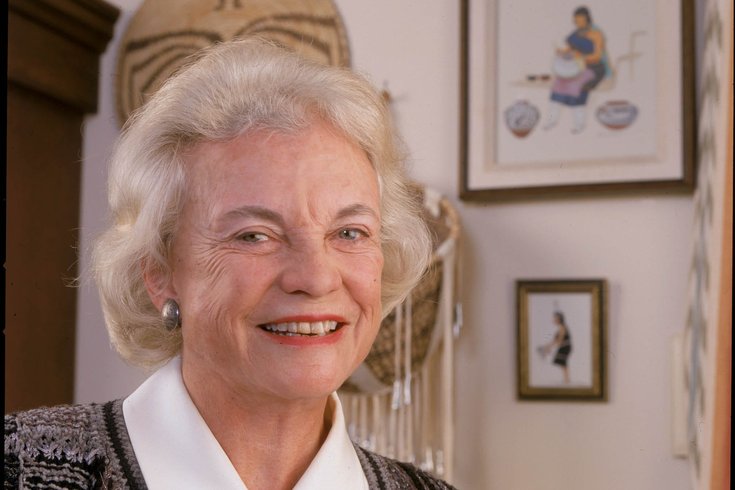
December 01, 2023
 H. DARR BEISER/USA TODAY NETWORK
H. DARR BEISER/USA TODAY NETWORK
Sandra Day O'Connor, the first woman on the U.S. Supreme Court, was presented the Liberty Medal at the opening of the National Constitution Center in Philadelphia in 2003. She died Friday at age 93.
When the National Constitution Center opened on Independence Mall on July 4, 2003, Sandra Day O'Connor – the first woman to serve on the U.S. Supreme Court – spoke about the importance of understanding and applying the ideals of the Constitution.
O'Connor, who died Friday of advanced dementia and a respiratory illness at age 93, was in Philadelphia that day to accept the prestigious Liberty Medal, which recognizes leadership in the pursuit of freedom.
During her remarks, which can be viewed online, O'Connor stressed that upholding the Constitution requires the support of more than the judicial branch. She noted the importance of state and federal legislators, who must interpret the document when drafting laws, and those who must apply them.
"Knowledge about the ideas embodied in the Constitution and the ways in which it shapes our lives is not passed down from generation to generation through the gene pool; it must be learned anew by each generation," O'Connor said. "It's not enough simply to read or memorize the Constitution. Rather, we should try to understand the ideas that gave it life and that give it strength still today."
At the time, polls indicated many Americans did not know the contents of the document, and less than half could name the three branches of government. That was still the case in 2022, though that percentage had risen to 56% just the year before. The drop-off was the first time in six years that Americans' awareness of the three branches had declined.
Throughout her career, O'Connor worked to rectify the dearth of knowledge about the U.S. government. She launched Our Courts, which later became iCivics, a nonprofit organization that engages children in civic learning.
During her speech in Philly, O'Connor emphasized the Constitution Center's role in teaching Americans about the nation's history.
"The Constitution Center and Independence Hall, together with the Liberty Bell, form a place that every American should visit," said O'Connor, who served on the institution's board of trustees. "It will contribute each and every day to the reinforcement of the basic principles that bind us together as a nation and a people."
The dedication ceremony was not without its near-mishaps. At one point, a large piece of the stage fell, narrowly missing O'Connor and others, to which she half-joked, "We could have all been killed, huh?"
O'Connor, who was born in El Paso, Texas and grew up on her family's ranch in Arizona, spent more than 24 years on the Supreme Court. She was appointed by President Ronald Reagan in 1981 after a nearly 30-year public service career that included serving as an Arizona state senator and as a justice on the Arizona Court of Appeals.
She was considered a voice of "moderate conservatism," and was a key swing vote in a number of high-profile cases. In 1992 she helped reaffirm the 1973 Roe v. Wade decision that had given women a constitutional right to abortion. She retired from the Supreme Court in 2006. Her seat was filled by Justice Samuel A. Alito.
In a 2021 article commemorating the 40th anniversary of O'Connor's Supreme Court nomination, Marci Hamilton, a political science professor at the University of Pennsylvania, recalled her time serving as a clerk for O'Connor in 1989 and 1990.
"She could not be bullied into changing her mind ... I watched her rise above pettiness in her personal dealings with others as well as in her opinions for the Court," Hamilton wrote.
"The business of the Court was only part of what SO'C expected of us. She imposed an ethos of the 'full life' in her chambers. We carved pumpkins for Halloween, visited the cherry blossoms in the spring, went to museums, and at least one clerk had to be the 'exercise clerk, who joined her for the 9 a.m. daily exercise class she organized in the building. ... I was blessed to be one of her clerks and, therefore, a part of her extended family."
In 2009, President Barack Obama awarded O'Connor the Presidential Medal of Freedom, the nation's highest honor given to a civilian.
Nine years later, O'Connor revealed she had been diagnosed with the beginning stages of dementia. Her husband, John O'Connor, had died of complications of Alzheimer's in 2009.
Follow Franki & PhillyVoice on Twitter: @wordsbyfranki
| @thePhillyVoice
Like us on Facebook: PhillyVoice
Have a news tip? Let us know.